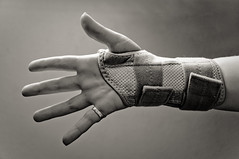Personal injuries are likely not something that most of us give any thought to until the unthinkable happens to us. Sustaining injuries because of the negligence or ill intent of another goes beyond the event itself, especially when there is long-term recovery ahead.
In many cases, the term personal injury refers to harm that is sustained beyond just the physical. While a person may come away with physical injuries, the wounds may also manifest in psychological and financial damage caused by missed work days, extensive medical bills, and event-related stressors.
Due to these injuries and the subsequent issues that arise from them, those who have been hurt may choose to seek compensation for their injuries, a viable and often necessary option for those who have been hurt and wronged.
The most important component in seeking personal injury compensation is getting the help of a competent legal professional, someone who specializes in personal injury law and has experience with the type of personal injury their client has sustained.
First, let’s look at the types of personal injury:
Injuries sustained on the job. Accidents at work happen, but when they happen because of negligent business practices, un-repaired machinery, or defective products, those who have sustained injuries may be entitled to money through workers’ compensation.
Injuries sustained as a result of defective products. Whether it’s the car that you drive, a toy that your child has played with, or a medication that you’ve taken, if you have sustained injuries as a result of using a defective product, you may be entitled to compensation under personal injury law.
Injuries sustained as a result of a car accident. Every moment that we are on the road, we run the risk of potential harm behind the wheel. Accidents sometimes happen, but when those events are caused by another driver’s negligent or distracted driving, then personal injury law may be on your side.
Injuries arising from medical malpractice. When we are under the care of a doctor, we put our trust and our faith in that doctor. When we become sick or injured because of the negligence of our medical team — or worse, when a loved one passes away as a result of such negligence — the emotional trauma can be devastating, especially on top of everything else. Working with a personal injury lawyer can help you receive the compensation you deserve.
Why an Attorney?
When you are injured as a result of any reason discussed above, you are left in a very vulnerable position. You have sustained bodily injuries for which you will require medical care — perhaps short-term care, perhaps long-term care including rehabilitation, medical equipment, etc. Such injuries can change your life, leaving you with medical expenses, missed work, family hardship, and more.
A knowledgeable and experienced personal injury attorney represents you, acting as your advocate through the legal process. When you have been hurt, it is imperative to have someone on your side who can ensure that you get what you are entitled to receive under law.
If you don’t move quickly in such a situation, you may lose the opportunity to cover the expenses that you have as a result of your injuries. Why should you be stuck with paying for the bills that come as a result of someone else’s negligence? At the very least, you deserve to have your expenses covered so that you can concentrate on healing. In this respect an experienced attorney can make all the difference in the world.
Remember, businesses will protect their bottom line at all costs, so it’s not surprising that getting compensation for your personal injury can be challenging. This challenge, however, does not mean that you are not entitled to compensation or that you should settle for less than you deserve.
A personal injury attorney can act on your behalf, helping to establish the facts of the case, helping you understand the personal injury law as it pertains to your particular injuries, and fighting to make sure that you receive proper compensation so that you can move past your injuries and go on with your life.
Author Bio – Jack Lachman writes on behalf of Tom Crenney & Associates of Pittsburgh, PA, a legal firm that specializes in processing claims for those injured on the job. If you’re on the lookout for lawyers trained in product liability law or any form of personal injury compensation, contact Tom Crenney & Associates today.

